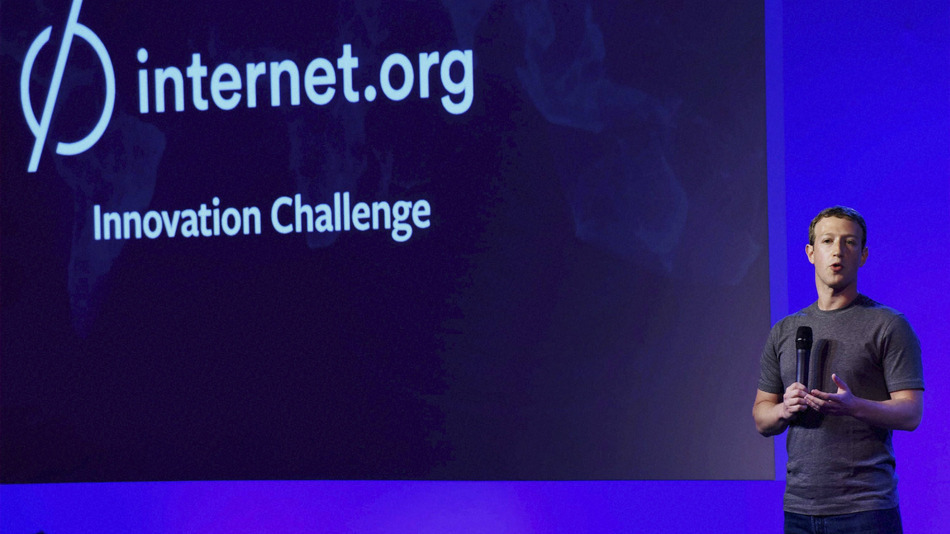by Parson Young
語言:
English /// 中文
Editor: Brian Hioe
Photo credit: Facebook
In conjunction with the Taipei Philosophy Book Club, New Bloom presents a new column, ‘Keywords’. ‘Keywords’ will review key terms from critical theory and philosophy as they are relevant to Taiwanese politics.
The Oxymoron of “Free Basics”
IN 2015, Facebook launched the “internet.org” initiative, which was touted to be able to connect an additional 1 billion people around the world to the Internet free of charge. The tech conglomerate claims that, by partnering with major phone service carriers operating around the world, Facebook will be able to provide anyone who has a smartphone access to the Internet.
But what supposedly be an ambitiously broad project is implemented in a decidedly much narrower method, namely, the people who are supposedly benefited from this program do not access the Internet directly, but only through an app created by Facebook which grants access to a select few functionalities as dictated by the company.
 Photo credit: dospeedtest.com
Photo credit: dospeedtest.com
A year later, as of Facebook’s Summer Conference on April 13th, this project only succeeded in connecting 24 million new people to the Internet. Facebook also faces charges from violating net-neutrality of the new users, with widespread complaints that the small range of functionalities granted only serve as avenues for intensive advertising. It is clearly a bad start, given Mark Zuckerberg’s direct access to and securing the backing of the highest levels of governments in all the countries where this project is rolled out. What is Facebook’s response to this disappointing result? By changing the project’s name to be called “Free Basics,” as well as appealing for even MORE advertisers to back the project.
The future of this project is yet to be seen, but it’s development thus far serves as an indicative case of the dialectical development and contradiction between technological advancement and capitalist mode of production, which can be observed everywhere in today’s world. While capitalism brought forth the advancement of these technologies, it now halts them from unleashing their potential. Only through socialist productive relations can the true potential of these achievements be realized. We as residents in this epoch could see, with unprecedented clarity, not only the people, but also the technologies that need to be released from the shackles of capitalism.
Socialized Internet
“The connection between distribution and the material conditions of existence of society at any period lies so much in the nature of things that it is always reflected in popular instinct. So long as a mode of production still describes an ascending curve of development, it is enthusiastically welcomed even by those who come off worst from its corresponding mode of distribution. This was the case with the English workers in the beginnings of modern industry. And even while this mode of production remains normal for society, there is, in general, contentment with the distribution, and if objections to it begin to be raised, these come from within the ruling class itself (Saint-Simon, Fourier, Owen) and find no response whatever among the exploited masses. Only when the mode of production in question has already described a good part of its descending curve, when it has half outlived its day, when the conditions of its existence have to a large extent disappeared, and its successor is already knocking at the door — it is only at this stage that the constantly increasing inequality of distribution appears as unjust, it is only then that appeal is made from the facts which have had their day to so-called eternal justice. “ – Friedrich Engels [1]
THE INFLUENCE of the spread of the Internet over human civilization does not need to be repeated here, as readers are likely to be reading this article online. What is far less emphasized, however, is the immense possibility that Internet has provided to enable the formation of socialist societies, far beyond what Marx, Engels, Lenin, and Trotsky could have imagined.
To begin with, note that the vast majority of the new technological services that became world wide social institutions, such as Facebook, Youtube, Twitter, and so on, rose to prominence not only through the logistical possibilities they provide for users, but gain value from the contents that the users have created themselves, which are hosted on these platforms. Aside from the content that the users generate, it is also the new forms of communities that transcends space and time that were created on these platforms that provide these technologies with added amount of use value for users. In other words, the very essence of these services are no longer defined by those who created them, but by the people who use them and the creations that were made through their interaction with each other on these platforms, well beyond what the owners of these services had in mind.
What is even more amazing is that the users of these platforms are creating things far beyond entertainment and recreational socializing. They are in fact creating glimpses of advancements in education, scientific research, politics, art, and so much more of what are pulling human civilization decisively forward.

One of the most exciting aspect of the Youtube community is the sprawling communities of users who create educational videos. One can find multitude of channels from elementary school to university levels on a wide variety of subjects, each offering a wide variety of ways viewers can digest course materials in unprecedented ways. What’s equally important is the interactivity of these videos through the comment sections, where people can discuss with the content creators or with other users. The PBS Digital Studios, a network that contains many educational channels, made it a standard practice for videos to create a comment response sections. Forum-based website Reddit also hosts an extensive array of educational communities in highly specific subjects, each filled with enthusiastic users willing to educate anyone curious about the subjects they are passionate in, such as r/AskHistorian among many others.
In art, we also see tremendous advancements in new ways that people create and display their art to one another. There are already popular idea-sharing platforms such as Pinterest. Yet there are also unexpected places where art finds new ground for expression and exhibition. We can look at the astonishing development of the video game Minecraft, which was initially designed as more of an adventure game with freedom to build things as one pleases, has now evolved into an amazing canvas where people build extremely elaborate art works. These users now routinely host exhibits for others to admire their works, which could be an important step in revolutionizing how art shows are being held.
Pokemon and Governance
ONE OF THE more common worries against the formation of a socialist worker’s government is that logistical difficulties might render it into a “rule by committee” and thus hampers people’s ability to directly participate in worker’s democracy. Granted that the logistical distance between the state and the people could certainly have been used to the advantage of Stalinized bureaucracies, the Internet most certainly minimizes the abilities for bureaucracies to circumvent democracy. In most bourgeois democratic countries governmental files are published directly online, and there are also experiments with voting through the Internet underway. In Taiwan we witnessed the development of the media company Watchout out of Taiwan’s indigenously BBS environment: PTT. The New Power Party also experimented with direct online nomination process to produce their legislator candidates. Nonetheless despite so much information is already public, many of the world’s bourgeois democracies still use archaic electoral methods and complex legal maneuvers that work to the detriment of democratic principles, the US being the most pronounced example with all its electoral intricacies, backward polling logistics, and regular voting frauds. Not only that, the capitalist economic system forces members of the working class to participate in a daily struggle for survival, thus making participation in politics a sacrifice in and of itself, especially now when global capitalism is in decline. It is not far off to say that staying fully updated and informed on current events is a full-time job. One of the most important prerequisites in a real democracy is time. The working class has long work hours, has long commuting times and sometimes even needs to work second jobs! Capitalism only offers democracy to the ruling class, while lording over the working class autocratically. One of the roles of technology in a socialist society is to reduce the work day, the work week and the work life–allowing people to engage in productive labor for its own sake, not as the drudgery of “work.”
 Twitch Plays Pokemon
Twitch Plays Pokemon
Despite this, the people continue to display ability to accomplish highly complex tasks en mass. We can look to the astonishing case of Project Twitch Plays Pokemon for a glimpse into the possibility of how democracy can be practiced in the future. The Pokemon video games are designed for a single player wielding a personal console, and contains extremely intricate control schema as well as endless possibilities of strategizing on both micro and macro levels. In 2014, an anonymous Australian programmer decided to conduct a social experiment and hosted a copy of one of the oldest Pokemon games on website Twitch.tv, but this time also adding functionalities that allow not one but everyone visiting the page direct control over the game. With thousands of people controlling a video game that was tailored for single player use, there was of course initial havoc. Yet, astonishingly, the players began to devise different systems of deliberation and decision making, and through this cumulative experience among as many as 121,000 simultaneous participants, the first game was completed in only 16 days. The experiment continued as players take on more and more recent and complex versions of Pokemon games. To date 20 games have been completed.
While I am far from suggesting a mechanical application of this model into any system of political deliberation, the case of Twitch Plays Pokemon shines light on the vast human potential to spontaneously form processes and institutions and make complex and numerous decisions en masse, now more than ever. We might even draw a parallel between this kind of phenomenon of today and the spontaneous formation of the Soviets more than 100 years back in Russia, where strike movements gave birth into autonomous council bodies comprised of workers that in turn became democratic institutions–upon which the embryonic socialist state was formed when October Revolution came to pass. It should be stressed that the formation of these kind of working class institutions were not from the design of Marxists at the time, but out of the historical conditions of the Russian working class that was on the move towards revolution. A similar formation of such kind of organization could also be seen in the Venezuelan revolution, in organizations known as “Bolivarian Circles,” where communities of workers deliberate on the administration of medical services, education, and public works of their own communities. The Black Panther Party of the United States in the late 60s also formed community-level bodies of this sort to administer clinic and food programs for children. All of these were created out of the hands of the working class interacting with their particular material conditions and levels of class struggle. Marxists should be ready to embrace the high possibility that as the crisis of global capitalism, and therefore class struggle, elevates, the Internet could well be an integral part of the organizations that the working class of advanced capitalist countries would go on to create in the coming days.
Humanity’s New Needs and Capitalism’s Fettering Effect Upon It
IN THE GERMAN IDEOLOGY, Marx made the important observation that a crucial law of motion in human civilization’s development is that as the most basic needs are satisfied, new needs will arise and in turn need to be satisfied. The creation of new needs, in fact, is referred to by Marx as “the first historical act.” [2]
In 1995, only 0.4% of the world population had access to the Internet as both web connectivity and a computer hardware were considered luxury or even novel. Only 20 years after, over 46.4% of the world are connected to the Internet in 2015. The United Nations declared the right to access internet as a basic human right, showing that even the global bourgeoisie have to concede that the Internet has a material necessity for the development of world’s productive forces.
Nonetheless this vast technology, powered and drew from its users and their interactions with one another, is now entering into crying contradiction with the profit-centric capitalist mode of production, which now holds it back from its true potential to propel humanity even further.
If we revisit all the aforementioned platforms, pregnant with energetic users that could really take their application to the next level, we found that the titular owners of these technologies are finding themselves to resort to measures that are detrimental to what creates values to their products in the first place, all in order to answer to the ultimate capitalist question: how to make profit from this?
 The Fine Bros. Photo credit: The Fine Bros
The Fine Bros. Photo credit: The Fine Bros
In Youtube, we saw the ridiculous case of a popular channel the Fine Bros Entertainment who attempted to trademark the use of the word “react” in order to force other users to pay them license fee in order to upload a video showing people reacting to something of their own. It should be noted that while the Fine Bros, who operate like a private business rather than casual users, are known for their reaction videos with high production values, but they by no means invented the format itself. In fact, such an action was not even considered by anyone prior, as most consider uploading reaction videos a casual pastime rather than serious profit-making ventures. The Fine Bros eventually succeeded in their filing, but faced such massive backlash that they later rescinded it. If we take a further step back and observe Youtube as a platform in general, its endless need to monetize now makes the videos cesspools of advertising and its platform an avenue to collect user behavior data, even launching Youtube Red, which essentially requires users to pay to remove all advertising.
If platforms are not already tools for monetization, then they are already cannibalized by the larger corporations in preparation to do. Minecraft was acquired by Microsoft with 2.5 Billion USD, while Twitch as a whole platform was acquired by Amazon for 970 million USD.
We might further note that with the rise of “The Internet of Things,” which is the increasing integration between physical objects and the internet, we also see businesses profiting essentially from values generated by the users and their interactions with each other, but is now fettered by the very nature of capitalism itself. The company Lyft’s product was initially designed for, and still describes their product, as a ridesharing network, essentially connecting people for more carpool opportunities for a fee. It has now developed into an unmistakable taxi service corporation, yet its drivers are all classified as independent contractors without a legal right for unionization and worker’s compensation.
 Photo credit: Lyft
Photo credit: Lyft
Finally, we might this full circle in examining the case of Facebook’s “internet.org” in and of itself. We could see that, while to a certain degree the bourgeoisie understands that there is a material need to proliferate Internet access to all, it still reveals capitalism’s utter inability to actually realize this project. When it is up to a private corporation to embark on a project that has public implications, it’s only too predictable that its concerns over profit-generation ultimately contradicts with the initial goal, and the end result is an extremely compromised and controversy-riddled project that progresses poorly.
How would a socialist approach resolve these impasses?
Unleashing Technology with Socialism
A MARXIST PROGRAM calls for the nationalization of all key industries with high social implications to be placed under democratic workers’ control, this is to be the basis of a democratically planned economy.
While thus far in history, all of the planned economies of the world were either bureaucratized or established upon a worker’s government already suppressed by bureaucratic dictatorship, it is undeniable that they have proven themselves to be highly effective in improving infrastructures of their own countries. It should always be reminded that the USSR beat the US in both sending a satellite and a human being into outer space, having endured two devastating world wars and begun with a backward economic conditions only 43 years ago in 1917. China was able to increase literacy from 20% to 69% in just 30 years time despite the concurrent boom in population. Cuba’s healthcare system and medical education infrastructure to this day surpasses that of the US both in quality and cost effectiveness. It should be noted that these planned economies, however, were unable to develop under the management of a small handful of bureaucrats and thus were increasingly prone to mismanagement, corruption, and inefficiency, ultimately unable to match with capitalism’s postwar growth. The solution would have been to realize a democratically planned economy and appeals for the same to be done by working class all over the world, which all of these bureaucracies failed to do. In any case, it was still historically effective in building infrastructures in these economically backward conditions, one can only imagine if planned economy was realized in an advanced economy and the enormous possibility it could bring to the world.
If we want to see a point of comparison of Facebook’s “Free Basics” conundrum, which is capitalism’s inability to negotiate between profit-making and provision of necessity to society, we can look to Leninist USSR’s success in proliferating radio across its boundaries.
 Leon Theremin and his invention
Leon Theremin and his invention
The Bolsheviks always viewed radio as a mass communication technology upon which a worker’s democracy can be built upon, especially in a place like Russia with its vast size and low literacy rate. In 1926 Trotsky also spoke of radio as an important education tool that would bridge the gap between town and country.
After the October Revolution Russia had yet to have voice radio. However within 3 years of concerted funding and planning, Soviet scientists were able to develop technologies that could carry human voice via radio waves. By 1922 Moscow had the most powerful radio station in the world, and shortly after the world’s first short-wave station was installed in Moscow in 1925. Radio science also advanced tremendously in Russia and found new applications in life, even creating primitive forms of electronic music, as symbolized by the invention of the Theremin. Of course we should never neglect the material limitations of technology at that time, and radio as well as radio jamming technology soon became Stalinist bureaucracy’s tool in controlling information, ultimately reflecting the material stringency which gave rise and ease for bureaucracy to monopolize politico-economic power at the time. The point is that this program was not rolled out with any consideration to make profits, but a focused need to satisfy a very real necessity at the time, enforced by a democratically operated worker’s state. Today we see the exact opposite in “Free Basics”: a privately-owned, unelected, for profit conglomerate filled with capital attempting to supply public goods across the world, and still cannot effectively meet this goal. One has to wonder which approach most effectively addresses both progress and efficiency.
Moreover, it should be pointed out that these companies already assume the position to hold tremendous power over society in terms of owning the data they collect on users as well as controlling the logistics of getting online. Taiwan’s specific relationship with Facebook, with the highest penetration of Facebook users in the world, might also be challenged by Mark Zuckerberg’s recent and tireless campaign to court China into unblocking Facebook, going as far as inviting Xi Jinping to name his newborn daughter. The ongoing struggle for net neutrality is in essence a fight for Internet freedom from private capital. What’s more reliable of a method to safeguard net neutrality for all than placing the key levers of Internet under democratic control of a worker’s government?
What A Socialist Revolution Can Bring
IN A WORLD now filled with socialized technology and new possibilities–while being dominated by a declining global capitalist system which is increasingly showing its inability to provide for the majority of society–it is now more appropriate than ever to understand how much better of a world we are able to build than the one we are currently living in. It is no longer a question of true material scarcity, but a problem that stems from a social formation which suboptimally utilizes resources. Unfortunately, the very nature of the bourgeois class and it’s control over political presents the biggest obstacle for us to realize this potential.

We must also say frankly that some of the interaction that occurs today on the internet is connected to the decline of human interaction–people connect via computer and then do not interact in person. In some cases it is a way of escaping one’s real life and living a virtual life. This will tend to disappear as people band together to change society and pessimism and cynicism is replaced with the optimism of a socialist future. This is why Marxists conclude that only a global revolution that creates genuine workers’ democracy around the world can allow for this advancement to take place.
Mark Zuckerberg himself said that “it’s not that connectivity is an end in itself. It’s the things that connectivity brings.” To that, Marxists would add: it is not that socialist revolution is an end in itself. It’s the things that socialist revolution brings.
[1] Engels, Friedrich. “Subject Matter and Method.” Anti-Dühring. Vol. 25. Moscow: Progress, 1987. 137-38. Print. Karl Marx Fredrick Engels Collected Works.
[2] Marx, Karl, and Friedrich Engels. “Primary Historical Relations, or the Basic Aspects of Social Activity: Production of the Means of Subsistence, Production of New Need, Reproduction of Men (the Family), Social Intercourse, Consciousness.” The German Ideology. New York: Prometheus, 1998. 47-48. Print.

